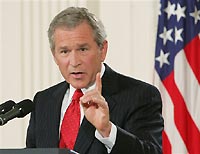George W. Bush meets Afghan President Hamid Karzai
U.S. President George W. Bush wants fresh assurances that Afghan President Hamid Karzai is dealing with his country's soaring drug trade and pervasive security struggles.

Bush on Wednesday was to meet with Karzai, a reliable ally, for the first time since hosting him in August at the Camp David presidential retreat in Maryland. The two are to review the familiar challenges that undermine Afghanistan's stability despite progress there.
Afghan opium poppy cultivation has hit a record high this year, fueled by Taliban militants and corrupt officials in Karzai's government, a U.N. report found last month. The country produces nearly all the world's opium, and Taliban insurgents are profiting.
Also, Afghanistan remains in a fight for basic security, a constant threat to its growth as a new democracy. Karzai is pledging to work hard on peace talks with the Taliban to draw the insurgents and their supporters "back to the fold," as he put it this week.
The United States has more than 20,000 troops in Afghanistan. Aides say it is natural for Bush to meet Karzai to review progress, but no single issue prompted their sit-down.
Bush, in New York for the annual gathering of the U.N. General Assembly, made only brief mention of the war in Afghanistan during his speech to world leaders Tuesday. He said the people of Afghanistan - and Iraq and Lebanon - were in a deadly fight for survival.
"Every civilized nation has a responsibility to stand with them," Bush said.
Bush also was to pivot to his domestic agenda Wednesday before wrapping up three days in New York. Bush planned to meet with the chancellor of New York City schools, Joel Klein, as the president planned to speak about his education reform law, which is up for renewal in Congress.
Before leaving town, Bush was to speak at a private fundraiser for the Republican National Committee. Back in Washington, more international diplomacy awaited.
The president was hosting a two-day climate meeting, starting Thursday, of major industrialized nations, the United Nations and a few developing countries.
Bush tried to emphasize throughout his meetings in New York that his efforts on climate change were in support of - not in competition with - a U.N. conference in December in Indonesia. That later session will be a time of negotiations on a new international climate agreement.
On the sidelines of the U.N. meeting, Bush pressed Iraqi Prime Minister Nouri al-Maliki on Tuesday to move on stalled measures deemed critical to political reconciliation. Much-delayed action, such as a national oil law, have bogged down in the Iraqi parliament amid factional bickering, which, in turn, has only deepened frustration among U.S. lawmakers.
Subscribe to Pravda.Ru Telegram channel, Facebook, RSS!


